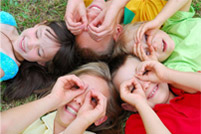From Midwestern University
June 27, 2012
It is hard to understate the value of regular eye checkups, especially for young children – and yet many families do anyway. According to the faculty and students at the Midwestern University Eye Institute, however, proper eye care is an invaluable part of a child’s development that should not be ignored.
One look at the numbers should be enough to underscore the vital importance of pediatric eye care:
1 in 5 American children have uncorrected vision issues.
Twenty percent of kids have what optometrists describe as “compromised” vision – issues which are correctable with proper care but are undiagnosed. According to the Center for Disease Control (CDC), only one out of every seven preschoolers receives an eye exam, and fewer than one in four receives some type of vision screening.
80% of what children learn in their first 12 years comes through visual processing of information.
The medical community agrees that vision is the dominant sense for learning and school success. Reading the 20/20 line in an eye exam is only one of 17 visual skills needed for reading, learning, and sports success. Not only do correctable but untreated vision problems put children at a disadvantage scholastically, but uncorrected issues can worsen over time and result in permanent vision loss, which adversely affects academic performance.
As many as 40% of all children with learning disabilities have vision problems.
Because vision and learning are so intimately connected, vision problems can be easily mistaken for learning problems. Correctable vision issues are often misdiagnosed as learning disabilities, ADHD, or dyslexia. For example, the behaviors between children with ADHD and children who have significant vision problems are extremely similar; it is only through proper screening and examination that a correct diagnosis be maintained. One mother whose daughter was believed to be “developmentally delayed” had her child’s vision examined; after vision correction and regular treatment, the daughter’s IQ has been measured at 135 and, at three years of age, is the youngest-ever member of MENSA.
Valley kids have the best chance to succeed when their families seek proper eye care, including eye exams for children as young as six months old, pediatric vision therapy and low vision treatments if necessary, and evaluation of common eye issues such as strabismus and amblyopia (lazy eye). Families can take advantage of these services at the Midwestern University Eye Institute, which provides comprehensive and state-of-the-art eye care from experienced optometrists at about half the cost of what consumers might pay elsewhere.



